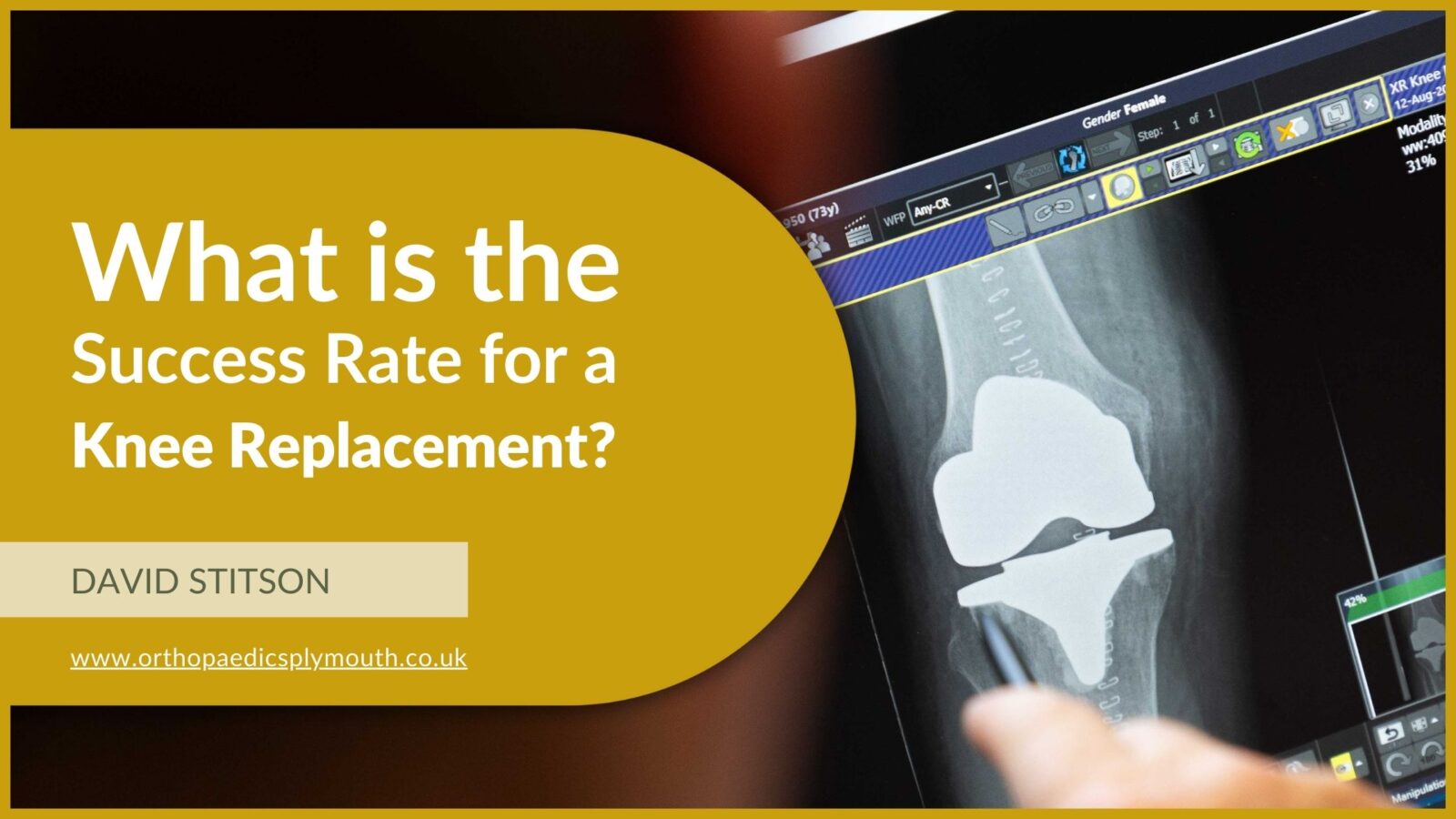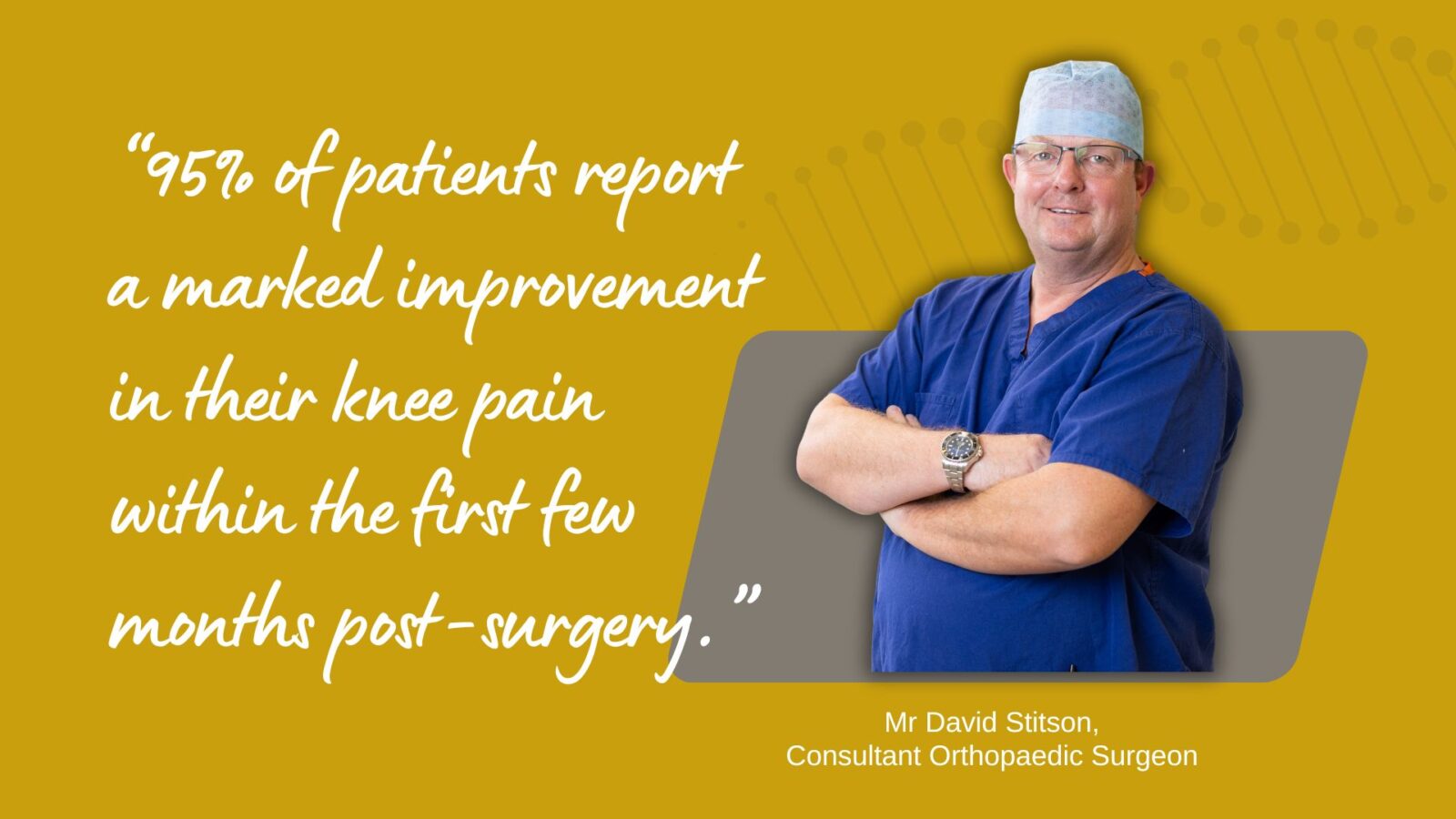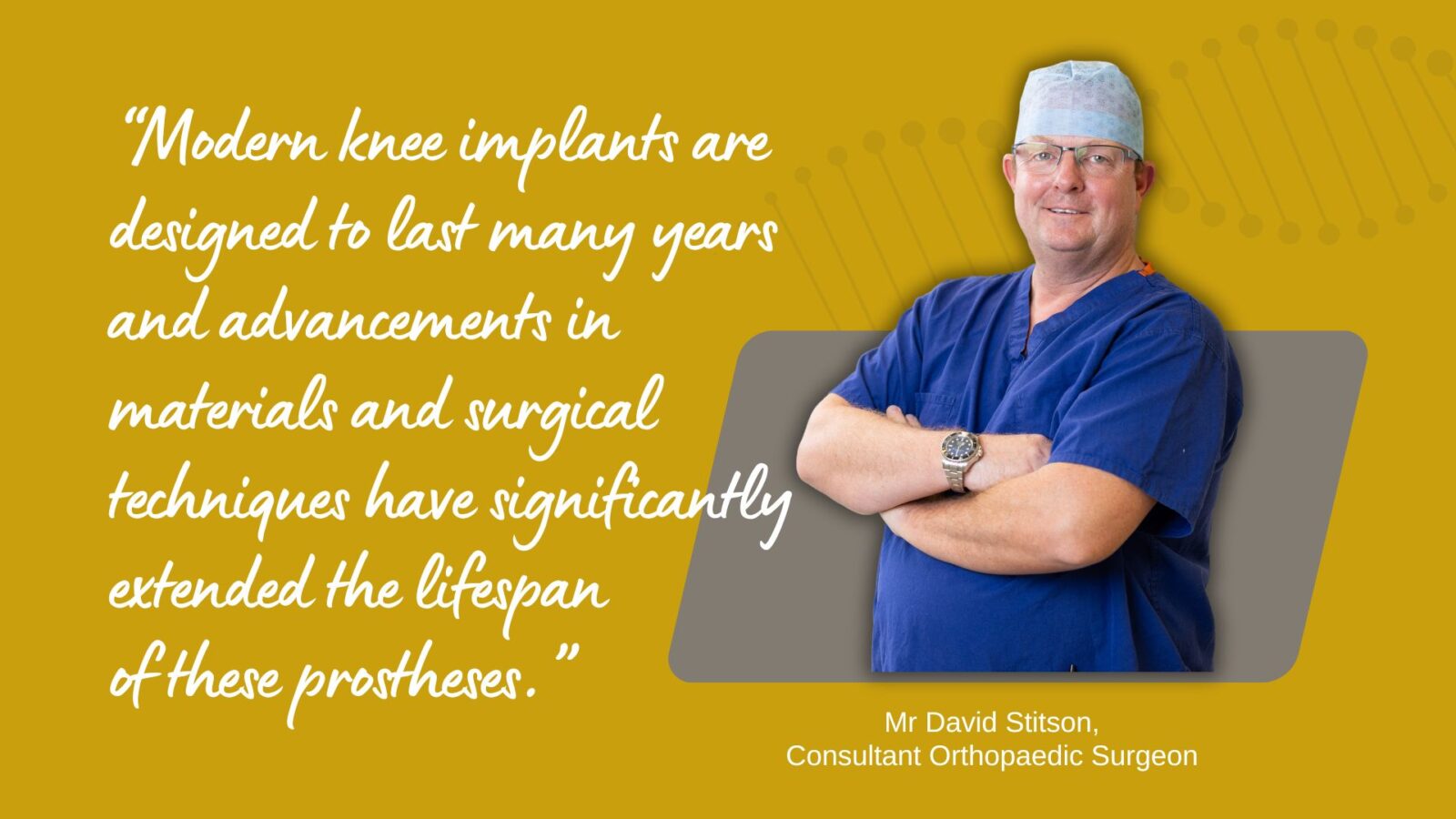Knee replacement surgery, or knee arthroplasty, is a common procedure designed to relieve pain and improve function in individuals with severe knee damage, typically caused by arthritis or injury.
Understanding the success rate of knee replacement surgery involves examining statistical outcomes, patient satisfaction rates and the longevity of the prosthesis.
Statistical Outcomes of Knee Replacement Operations
Knee replacement operations are among the most frequently performed orthopaedic procedures in the UK with the success rate generally high and with many studies reporting excellent outcomes. According to the National Joint Registry (NJR), over 100,000 knee replacements are carried out annually with 90% of people experiencing a significant reduction in knee pain and improvement in their ability to perform common activities.
The success of these operations can be measured through various metrics, including complication rates, revision rates, and overall patient outcomes.
Post Knee Surgery Success:
The vast majority of patients experience immediate relief from the knee pain that necessitated the surgery. About 95% of patients report a marked improvement in their condition within the first few months post-surgery.
Complication Rates:
The complication rate for knee replacement surgery is relatively low. Major complications such as infections, blood clots, implant failure etc., occur in less than 2% of cases.
Revision Rates:
The NJR data indicates that approximately 95% of knee replacements last for at least 10 years without the need for revision surgery. This rate drops slightly to around 85% at the 20-year mark. These figures demonstrate a high level of durability and effectiveness.
Patient Satisfaction Rates for Knee Replacement
Patient satisfaction is a crucial metric for us to evaluate the success of any knee replacement surgery. Numerous studies and feedback have shown that the majority of knee replacement patients are highly satisfied with their outcome post-surgery.
Pain Relief and Function:
Studies have shown that over 90% of patients report significant pain relief and improved knee function following surgery. Many patients experience a substantial enhancement in their quality of life, being able to return to activities they previously found difficult or impossible.
Overall Satisfaction:
According to Patient-Reported Outcome Measures (PROMs) collected by the NHS, 85-90% of patients are highly satisfied with the results of their knee replacement surgery one year post-operation. Factors influencing satisfaction include:
- the extent of pain relief,
- functional improvement,
- improved mobility and
- overall quality of life
Functional Improvement:
Many patients find they can return to activities they were unable to do before the surgery. This includes
- walking longer distances,
- climbing stairs and
- participating in low-impact sports
Long-Term Satisfaction:
Even 10-15 years after their knee surgery, many patients remain satisfied with the results. Long-term studies indicate that the positive effects of knee replacement can last for decades.
The longevity of modern knee prostheses is impressive, often lasting 15-20 years or more, making knee surgery a viable long-term solution for those suffering from debilitating knee pain.
Longevity of the Prosthesis
The longevity of the knee prosthesis is a critical aspect of the overall success of knee replacement surgery. Modern knee implants are designed to last many years and advancements in materials and surgical techniques have significantly extended the lifespan of these prostheses.
Materials and Technology:
Knee prostheses are typically made from metal alloys, and high-grade plastics. These materials are designed to withstand significant wear and tear, contributing to the implant’s longevity.
15-20 Year Lifespan:
Current data suggests that about 90-95% of knee replacements are still functioning well 10 years after surgery. Approximately 85% are still performing satisfactorily at 20 years post-surgery.
Factors Affecting Longevity:
The durability of the knee prosthesis can be influenced by several factors including the patient’s activity level, weight and adherence to post-operative care guidelines. Younger and more active patients may experience wear and tear on the implant more quickly than older, less active individuals.
Revision Knee Surgery Rates:
Despite the high success rate, some patients may require revision surgery. This is often due to factors such as implant loosening, wear, instability or infection. The rate of revision surgeries is relatively low, with studies indicating that only about 10% of patients need a revision within the first two decades after the initial surgery.
Survival Rates:
As mentioned earlier, about 95% of knee replacements last for at least 10 years, and 85% last up to 20 years. Some studies even suggest that newer prostheses could potentially last longer, with projections indicating a 25-30 year lifespan in some cases.
Knee replacement surgery boasts a high success rate
Knee replacement surgery boasts a high success rate, with most patients experiencing significant pain relief, improved mobility, and high satisfaction rates. The longevity of modern knee prostheses is impressive, often lasting 15-20 years or more, making this surgery a viable long-term solution for those suffering from debilitating knee conditions.
While complications and the need for revision procedures do occur, they are relatively uncommon, further underscoring the overall effectiveness and reliability of knee replacement as a treatment option.
For those considering this type of surgery, the positive outcomes and advancements in medical technology offer a promising outlook for a pain-free and active future.
About Knee Surgery
Knee replacement surgery replaces the worn out, painful and stiff knee joint with a new prosthetic joint. This procedure which may be a partial or a total replacement is normally performed under spinal anaesthesia and is usually followed by a night or two in the hospital. Day-case knee replacement surgery may be an appropriate option for you.

About Mr Stitson
David Stitson is a Plymouth-based Consultant Trauma and Orthopaedic Surgeon. Trained both in the UK and internationally, he has worked in medicine for more than 20 years for the NHS, for the Royal Air Force and in private practice. Mr Stitson operates privately at the Nuffield Health Hospital, Plymouth.

The Nuffield Plymouth CQC Rating
The Nuffield Hospital has a history that spans over half a century and has built a reputation for high standards of care, professionalism and expertise in delivering health services. They aim for continuous quality improvement in everything they do.
Active Quality and Governance programmes are in place at the Nuffield Hospital Plymouth. As part of this, the hospital is inspected by independent healthcare regulators to ensure it meets the fundamental standards of quality and safety as determined by the regulating body (CQC).
In the most recent inspection, Plymouth Nuffield Hospital was rated as ‘Good’ overall, however, the surgical element of the inspection was rated as ‘Outstanding’. The hospital was referred to as:
“Outstanding in effective and caring, and
Good in safe, responsive and well-led.”






